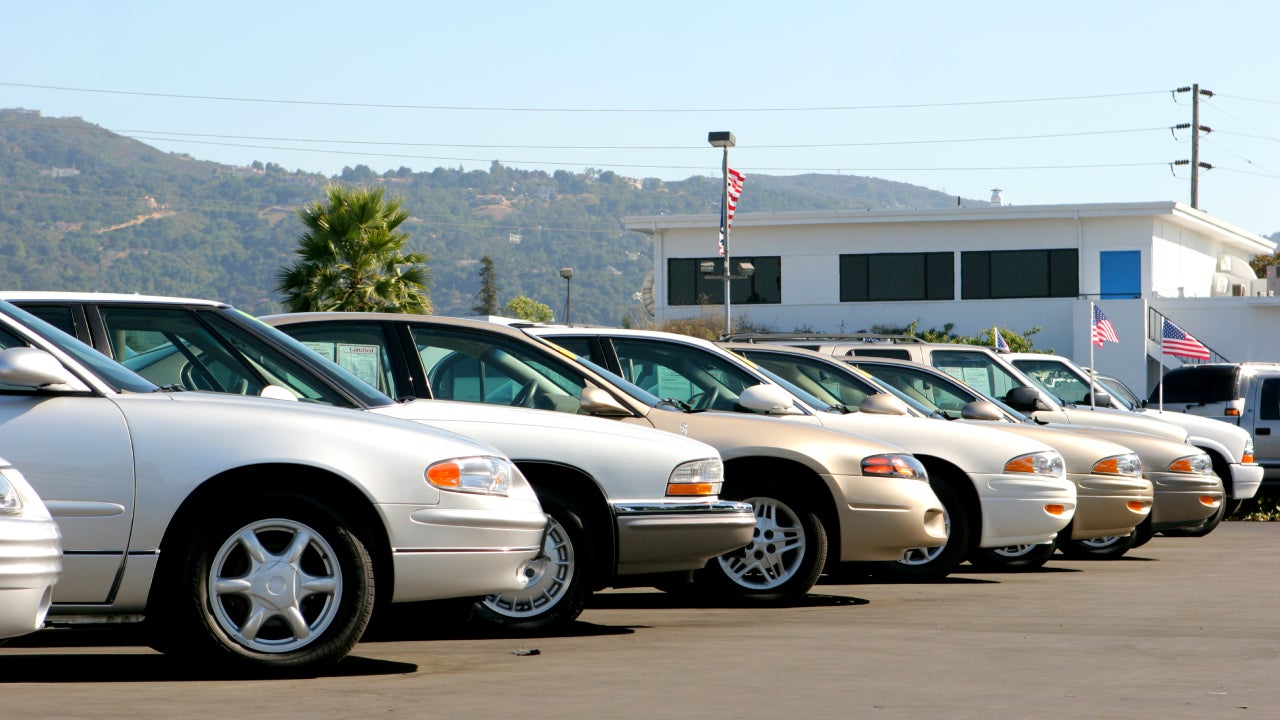Tips for first-time car insurance buyers

If you live with your parents, it can be a financially smart decision to stay on their car insurance policy as long as they’ll allow. However, if they finally put the bill on your plate or you move out of the house, you’ll likely be confronted with the challenge of buying car insurance for the first time. Or, maybe you’re buying a car for the first time and need to figure out how to insure it before driving off the lot. While these situations may sound daunting, we’re here to tell you that getting coverage is usually easier than you think — especially with most providers having full digital services that can help you obtain a policy quickly and easily. Here are some auto insurance tips to help first-time buyers secure the right coverage at an affordable rate.
Tips for buying car insurance
If you’ve never bought car insurance before, the process may not be as complicated as you think. You’ll need to determine your coverage needs, shop around for a provider with the best quote for your profile and set your policy up before you begin driving. We’ll dig deeper into each step of the process with car insurance advice from our team’s experts.
Decide how much coverage you need
The amount of coverage you’ll need may vary based on your age, where you live, vehicle type, miles driven and personal preferences, but there are a few constants. Every state requires car insurance policies to include liability coverage, and you may also be required to purchase other types of coverage based on your state’s laws. If your vehicle is financed or leased, your lender likely requires you to carry full coverage — that is, comprehensive and collision coverage — to protect their (and your!) investment.
If you buy your vehicle outright without working with a lender, you can opt for minimum insurance coverage. But keep in mind this minimum coverage only financially protects the other driver, not you, your passengers or your new vehicle. If you don’t think you could afford to cover your own damages and medical bills after an accident out of pocket, you may want to consider buying additional coverage. Let’s go over the most common car insurance types you may be able to add to your policy:
- Collision coverage: Covers damages to your vehicle sustained in a collision with another vehicle or object.
- Comprehensive coverage: Covers your car for damages that are not related to a collision with another vehicle or object, such as hitting an animal, fire, theft, vandalism and falling objects.
- Personal injury protection (PIP): Covers you and your passengers if you sustain injuries in an auto accident, regardless of who is at fault. PIP may also cover funeral expenses and lost wages.
- Uninsured/underinsured motorist coverage: Covers you for damages caused by uninsured or underinsured motorists. In a few states, this may also cover you in the case of hit-and-run accidents. Some states require uninsured motorist coverage.
- Gap insurance: Covers the difference between the insurance payout and your remaining loan balance if your financed car is stolen or declared a total loss while you still owe more than it’s worth.
The purpose of car insurance is to allow your insurance company to step in to cover your financial responsibility if you cause an accident, and to repair or replace your vehicle if it sustains more damage than you could afford to pay for on your own. Your car insurance policy should have enough coverage to comfortably fulfill those purposes. If you’re not sure how much coverage you need, talking to an insurance agent or broker could help you decide.
Decide what factors you want in an insurance company
All insurance companies will offer the same basic types of auto insurance coverage — but not all carriers are the same. Consider what’s most important to you when considering which insurer to work with:
- Customer service: If you’ve never bought insurance before, it might be helpful to work with a company whose representatives are highly rated.
- Cost: First-time car owners often pay more for car insurance, especially if they’re under age 25 or have limited driving experience. Finding a carrier with affordable rates may be a priority in your search.
- Coverage options: Some insurance companies offer unique coverage options that could be a fit for your needs (more on this below!). If you need specific add-ons that aren’t available everywhere, keep this in mind as you shop.
- Local agents: If you’d prefer to get insurance through an agent, your choice may be influenced by the carriers your local agents work with.
- Mobile tools: If your ideal car insurance policy is one you can purchase and manage through your phone, look into carriers with highly rated apps.
Research available carriers
If you’ve been insured under your parents’ policy, it can be fairly straightforward to get a quote from the same provider since you’re already in their system. However, if you’re starting your research from scratch, you could review our list of the best car insurance companies or consider third-party ratings from institutions like these:
- AM Best: Evaluates an insurer’s financial strength and ability to pay back claims.
- J.D. Power: Studies customer satisfaction, claims satisfaction and digital experience for U.S. auto insurers.
- Standard & Poor’s: Evaluates a carrier’s overall financial health and ability to pay back claims.
- National Association of Insurance Commissioners (NAIC): Tracks the rate of customer complaints for each insurer relative to its market share.
In general, you’ll likely want to find a company with high ratings for customer satisfaction and financial strength, and low ratings for customer complaints. However, keep in mind that you’ll need to compare these metrics against the quotes that each carrier gives you.
Compare coverage options
As you’re researching carriers, you may find companies that offer other valuable add-ons in addition to the standard coverage that all companies provide. These add-on coverage options, commonly called insurance endorsements, may allow customers to tailor their policy to their specific needs.
For instance, you may be eligible for accident forgiveness if you have been claim-free for a certain amount of time, usually three to five years. If you drive for Lyft, Uber or other rideshare companies, you may want to explore rideshare insurance.
Ask about discounts
One way you could potentially save on your car insurance is through discounts. Most carriers offer at least a couple discounts that might save you a bit on your premium if you qualify.
Some of the best car insurance discounts include:
- Bundling discounts: You might earn a discount if you have an auto insurance policy and another type of insurance policy, like homeowners insurance, with the same carrier.
- Vehicle safety discounts: Some carriers extend a discount if your vehicle has additional safety features like running lights or curtain airbags.
- Safe driving discounts: You might be eligible for a discount if you have no accidents or moving violations on your record for several consecutive years.
- Paperless and paid-in-full discounts: Many carriers extend a discount for simple strategies like opting for paperless billing or paying your premium in full.
- Good student discounts: If you are a full-time student in good academic standing or insure one on your policy, you might earn a discount.
Compare quotes from multiple carriers
Most insurance experts recommend comparing quotes from multiple carriers when shopping for auto insurance. Insurance companies may have different car insurance rates, coverage options and discounts, so comparing quotes may help you find the cheapest company for your individual insurance needs.
To determine which company offers the best rates, consider comparing the same coverage types, limits and deductibles across multiple carriers. This may give you an idea of which company offers the lowest price for the coverage you need.
Teenagers and young adults below the age of 25 typically pay higher car insurance premiums due to their lack of experience and heightened risk level, which makes comparing quotes even more critical if affordability is a priority. While there is certainly a sense of autonomy that comes with getting your own car insurance policy, you could save substantially by staying on your parents’ policy if you still live at home.
First-hand insights: When to buy car insurance
If it’s your first time getting car insurance, one big question on your mind may be when to make the big purchase — before getting your new car, or after?
The short answer: you’ll need car insurance in order to legally drive your new car home, so be sure to have a plan to buy insurance beforehand. In order to do that, you may need to ask the seller for the car’s VIN and contact your insurer to make sure that your coverage will start the day you pick up the car.
We turned to Reddit to hear how real car buyers have navigated this tricky timeline:
Reddit user review
*The quotes and citations included on this page have been verified by our editorial team and are accurate as of the posting date. Outlinked content may contain views and opinions that do not reflect the views and opinions of Bankrate.
How to get a car insurance quote
There are several ways to get a car insurance quote. You may choose to get quotes yourself or use a licensed insurance broker to compare your options. Different carriers may offer quotes in person, online or over the phone.
- Carrier website: Many carriers allow customers to get online quotes through their website, which offers convenience — but it can get monotonous to go through the same process for every company you want to compare.
- Insurance agent: There are two types of insurance agent; “captive” agents, who only work with one insurer, and “independent” agents, who can help you get quotes from many insurers.
- Insurance broker: Unlike insurance agents, brokers don’t work for insurance companies. Instead, they help shoppers determine their insurance needs and compare quotes from multiple insurers.
- Online marketplace: If you prefer to do business digitally, you may want to compare car insurance rates using an online comparison tool.
Most insurance professionals recommend getting quotes from at least three carriers to compare pricing and coverage options. If you like the quoted premium and coverage selections with a carrier, you can move forward with purchasing the policy. However, the quoted premium may differ from the final price, especially if your claims or driving history brings up a ticket or accident that could affect your rates.
What do I need to get car insurance?
During the car insurance quoting process, you will be asked to provide information about yourself, other household drivers, the vehicle and any past insurance history, if applicable.
Driver information you may need for all household drivers includes:
- Full legal name
- Driver’s license number
- Date of birth
- Social Security number
- Address
- Ticket and accident history, if relevant
Your age, driving history and ZIP code are factors that may impact your car insurance rates, so insurers may ask for that information to create a quote. Insurance companies may ask for information regarding your driving history, but they also have access to motor vehicle information to verify driving and claims history for yourself and any other drivers listed on your policy — so be sure to give accurate information.
You will also likely need the following vehicle information:
- Year, make and model of your vehicle
- Vehicle identification number (VIN)
- Mileage
- Date of purchase
The make and model of the car you drive and how many miles you drive may affect your insurance pricing. The VIN could provide valuable information to the insurance company, including any safety features that could earn you a discount.
Frequently asked questions
Why we ask for feedback Your feedback helps us improve our content and services. It takes less than a minute to complete.
Your responses are anonymous and will only be used for improving our website.
You may also like


How much car insurance do I need?


How to choose the best car insurance company




